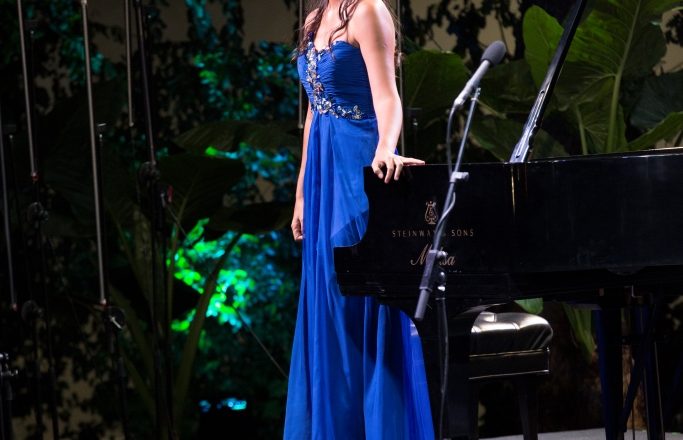
Mahani Teave: Rapa Nui Odyssey
Rubicon Records
Pianist Mahani Teave (b. 1983) delivers exceptional performances on this one hundred-minute solo release, but it’s the circumstances that led to its recording that are especially fascinating. A native of Rapa Nui (Easter Island), she left for mainland Chile at the age of nine to study and to begin pursuing her dream of becoming a classical pianist. After attending the Cleveland Institute of Music and Berlin’s Hans Eisler Music Academy and giving concerts in Europe, Asia, and South America, she set aside performing at thirty to return to her homeland and establish Toki Rapa Nui, the island’s first music school. In addition to providing free lessons, the school, built from recycled materials and using solar panels for energy, teaches students about environmental sustainability and instills in them an appreciation for island culture and the planet.
Three years ago, the cruise ship David Fulton and his wife were aboard made a stop at Easter Island, whereupon a recital was presented by the Toki Rapa Nui students for the passengers. After their performance finished, Teave played on an old upright piano and astonished Fulton in the process. When he later asked where an album by her might be purchased, she replied she’d never made one. That set in motion steps that would bring her to Seattle’s Benaroya Recital Hall to make her debut album, which she recorded in only two days. As taken by Teave’s story was Emmy award-winning producer and director John Forsen, who made a film about it, Song of Rapa Nui, currently available for viewing at Amazon Prime. Consistent with the spirit of the saga, all proceeds generated by the album are being used to support the school.
In liner notes, Fulton admits that as the recording session date came closer, second-guessing crept in. Had, he wondered, his impression of Teave’s talent been inflated by the splendour and beauty of the setting where he first heard her play? Had the transporting experience of being in a foreign land and enjoying its food, wine, and local colour affected his judgment? “After all,” he writes, “how good would a pianist from one of the most remote places on the planet be?” Of course any doubts were immediately dispelled the moment the session began and Fulton realized he was hearing a musician of extraordinary ability.
Teave performs material by J. S. Bach, Handel, Liszt, Chopin, Scriabin, and Rachmaninov, with the set capped by a stirring treatment of a traditional Rapa Nui folk song, “I he a Hotumatu la.” Some of the pieces are fiendishly difficult, yet she makes their realization seem effortless. Dazzle sets in right away with a terrific reading of Bach’s Chromatic Fantasia & Fugue in D minor. Teave impresses in the most challenging technical passages, but she excels as much in her sensitive handling of the slower episodes. She executes the four short movements of Handel’s Suite No. 5 with aplomb (see the stunning “Air & Variations,” for example) and Scriabin’s lovely Prelude & Nocturne for the Left Hand Op. 9 with sensitivity.
As strong an impression as the recording as a whole makes, it’s Teave’s performances of the lengthier settings by Liszt and Chopin that stand out most. Extending across fifteen minutes, the former’s Ballade No. 2 in B minor is a majestic travelogue that alternates between thunderous waves and graceful introspection. As powerful is her rendering of Liszt’s Vallée d’Obermann in E minor, in particular for the artistry she shows in her execution of its swoon-inducing slower parts. In the release’s second half, Teave ventures deeply within Chopin’s Barcarolle Op. 60 in F sharp major and scales the considerable heights of the Scherzo No.1 Op. 20 in B minor. Enhancing those performances are two exquisite Chopin nocturnes and a short sampling of Rachmaninov. The ease with which she transitions between the contrasting sections in all such pieces is masterful.
Might Rapa Nui Odyssey be Teave’s sole recorded statement? It would be a shame for a talent so bountiful to be documented but a single time. It’s reasonable to expect, however, that if the prospect of profits being directed to the school were to remain in place for future recordings, the likelihood of them materializing could be strong. Certainly someone with the gifts Teave clearly possesses deserves to be heard more than once.


